高中英语课堂口语纠错方法
高二口语表达中的语法错误与纠正
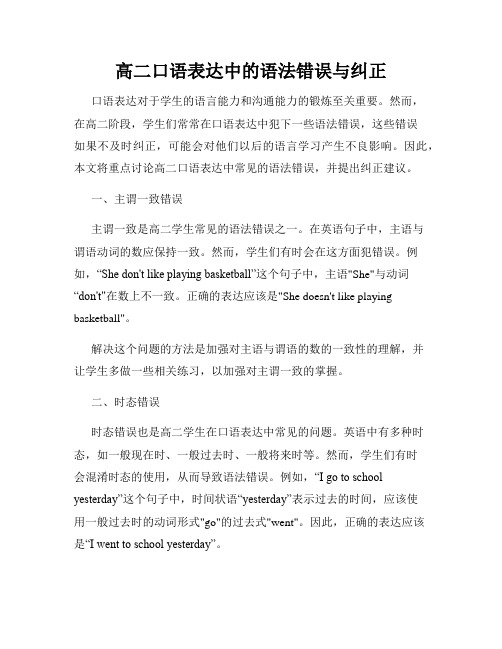
高二口语表达中的语法错误与纠正口语表达对于学生的语言能力和沟通能力的锻炼至关重要。
然而,在高二阶段,学生们常常在口语表达中犯下一些语法错误,这些错误如果不及时纠正,可能会对他们以后的语言学习产生不良影响。
因此,本文将重点讨论高二口语表达中常见的语法错误,并提出纠正建议。
一、主谓一致错误主谓一致是高二学生常见的语法错误之一。
在英语句子中,主语与谓语动词的数应保持一致。
然而,学生们有时会在这方面犯错误。
例如,“She don't like playing basketball”这个句子中,主语"She"与动词“don't"在数上不一致。
正确的表达应该是"She doesn't like playing basketball"。
解决这个问题的方法是加强对主语与谓语的数的一致性的理解,并让学生多做一些相关练习,以加强对主谓一致的掌握。
二、时态错误时态错误也是高二学生在口语表达中常见的问题。
英语中有多种时态,如一般现在时、一般过去时、一般将来时等。
然而,学生们有时会混淆时态的使用,从而导致语法错误。
例如,“I go to school yesterday”这个句子中,时间状语“yesterday”表示过去的时间,应该使用一般过去时的动词形式"go"的过去式"went"。
因此,正确的表达应该是“I went to school yesterday”。
要纠正学生的时态错误,教师可以通过示范和练习来帮助学生掌握各个时态的用法,并让学生在日常口语练习中多加注意时态的正确运用。
三、句子结构错误句子结构错误也是高二口语表达中常见的问题之一。
学生们有时会忽视句子的并列结构、从句结构等,导致句子不通顺或语法错误。
例如,“I like swimming and to play basketball”这个句子中,动词"like"后应该使用动名词形式,即"swimming",而不是使用不定式形式“to play”。
英语口语教学中的课堂纠错技巧

英语口语教学中的课堂纠错技巧Every mistake is a gift.在之前的文章中我们介绍过学生在英语学习中常犯的错误类型: errors/slips. 面对不同的错误,教师的纠错方法也不尽相同。
今天先介绍几个口语课上的纠错技巧:1.时间轴辅助当学生在时态使用上发生错误,我们可以在黑板上画出时间轴:并在轴上标注时点提醒时态。
2.手势或表情回应这种方法适用于口误的slips,最好不要当时打断学生,但又要提醒学生的错误。
这时可以通过表情和手势做出反馈。
英语老师可以和学生们事先约定好几个动作来表示要注意的各种问题,比如发音、用词、搭配、句型或时态等等。
3. 重复错误同样适用于slips这些小问题,当学生不小心发生错误,老师还可以通过提高语调重复错误内容,让学生自行发现并及时改正。
4. 同伴纠错有时候让学生之间互相纠错也是个不错的办法,某位学生发生错误后,老师可以提醒大家出现了问题,其他学生帮助指正。
这种纠错方法能够让学生在课堂上注意力更加集中,并且增强自信心和独立意识。
5. 延迟纠错口语练习在训练流利度的时候,尤其是学生进行role play或是presentation的时候,为了不影响学生的表达,老师可以先将错误的地方记录下来,活动结束后不要直接指出具体犯错误的学生,而只要把错误的内容逐一列出来,引导同学们一起纠正。
6. 指出错误在做口语精确度而非流利度训练时,我们需要集中学生注意力,明确指出学生的错误并解释原因,这种方法常用于errors类型的错误。
7.复述更正家长在孩子学说话时经常采用这种纠错技巧。
当学生说出一个含有错误的句子时,老师可以通过重复正确表述来纠正句子中的错误,例如:S: We go to school yesterday.T: Yes, that's right. We went to school yesterday.对于学生句式和措辞方面的错误,也可以用这种方法纠正。
克服英文口语中的语法错误的六个方法
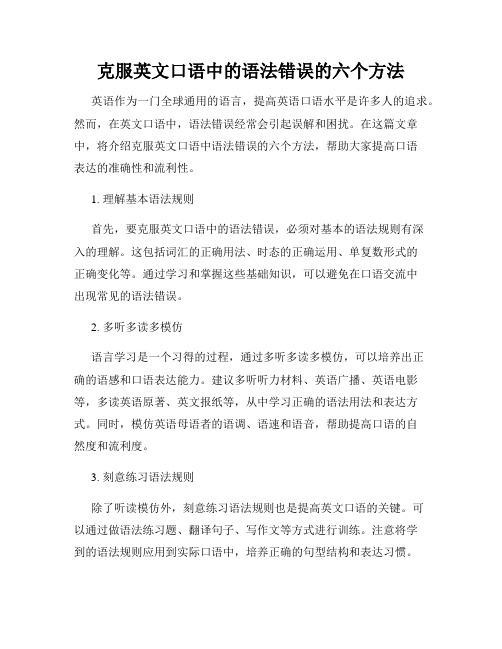
克服英文口语中的语法错误的六个方法英语作为一门全球通用的语言,提高英语口语水平是许多人的追求。
然而,在英文口语中,语法错误经常会引起误解和困扰。
在这篇文章中,将介绍克服英文口语中语法错误的六个方法,帮助大家提高口语表达的准确性和流利性。
1. 理解基本语法规则首先,要克服英文口语中的语法错误,必须对基本的语法规则有深入的理解。
这包括词汇的正确用法、时态的正确运用、单复数形式的正确变化等。
通过学习和掌握这些基础知识,可以避免在口语交流中出现常见的语法错误。
2. 多听多读多模仿语言学习是一个习得的过程,通过多听多读多模仿,可以培养出正确的语感和口语表达能力。
建议多听听力材料、英语广播、英语电影等,多读英语原著、英文报纸等,从中学习正确的语法用法和表达方式。
同时,模仿英语母语者的语调、语速和语音,帮助提高口语的自然度和流利度。
3. 刻意练习语法规则除了听读模仿外,刻意练习语法规则也是提高英文口语的关键。
可以通过做语法练习题、翻译句子、写作文等方式进行训练。
注意将学到的语法规则应用到实际口语中,培养正确的句型结构和表达习惯。
4. 养成阅读习惯阅读是提高英文口语语法的有效途径之一。
通过大量阅读英文原著、英语报纸杂志等,可以了解英语句型的应用场景和惯用法,提高英文语法的准确性和灵活性。
同时,阅读可以拓展词汇量,增加语言输入,为口语表达提供更多素材。
5. 积极参加口语练习口语练习是克服语法错误的关键环节。
可以参加英语角、语言交流小组等口语练习活动,与他人进行实际的口语对话。
在实践中发现和纠正自己的语法错误,与他人交流中逐步提高自己的口语表达能力。
6. 寻求专业指导最后,如果在语法学习和口语练习中遇到困难,可以寻求专业指导。
可以找英语老师或参加英语培训班,接受系统性的语法讲解和口语训练。
通过专业指导,可以更快地克服语法错误,提高口语水平。
总结起来,克服英文口语中的语法错误需要掌握基本语法规则、多听多读多模仿、刻意练习语法规则、养成阅读习惯、积极参加口语练习以及寻求专业指导等方法。
英语口语中的纠错原则
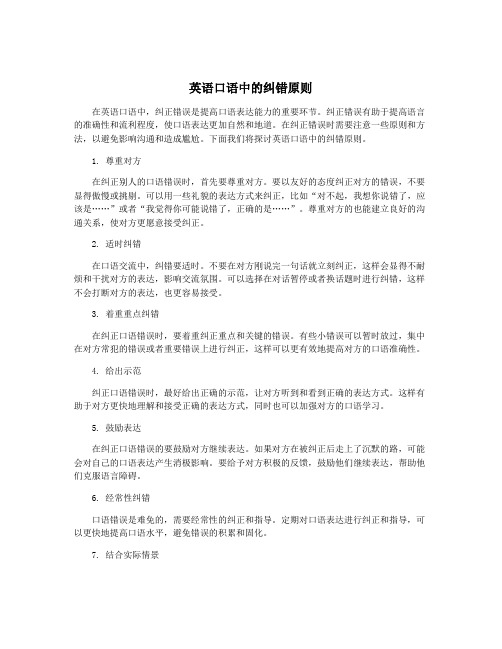
英语口语中的纠错原则在英语口语中,纠正错误是提高口语表达能力的重要环节。
纠正错误有助于提高语言的准确性和流利程度,使口语表达更加自然和地道。
在纠正错误时需要注意一些原则和方法,以避免影响沟通和造成尴尬。
下面我们将探讨英语口语中的纠错原则。
1. 尊重对方在纠正别人的口语错误时,首先要尊重对方。
要以友好的态度纠正对方的错误,不要显得傲慢或挑剔。
可以用一些礼貌的表达方式来纠正,比如“对不起,我想你说错了,应该是……”或者“我觉得你可能说错了,正确的是……”。
尊重对方的也能建立良好的沟通关系,使对方更愿意接受纠正。
2. 适时纠错在口语交流中,纠错要适时。
不要在对方刚说完一句话就立刻纠正,这样会显得不耐烦和干扰对方的表达,影响交流氛围。
可以选择在对话暂停或者换话题时进行纠错,这样不会打断对方的表达,也更容易接受。
3. 着重重点纠错在纠正口语错误时,要着重纠正重点和关键的错误。
有些小错误可以暂时放过,集中在对方常犯的错误或者重要错误上进行纠正,这样可以更有效地提高对方的口语准确性。
4. 给出示范纠正口语错误时,最好给出正确的示范,让对方听到和看到正确的表达方式。
这样有助于对方更快地理解和接受正确的表达方式,同时也可以加强对方的口语学习。
5. 鼓励表达在纠正口语错误的要鼓励对方继续表达。
如果对方在被纠正后走上了沉默的路,可能会对自己的口语表达产生消极影响。
要给予对方积极的反馈,鼓励他们继续表达,帮助他们克服语言障碍。
6. 经常性纠错口语错误是难免的,需要经常性的纠正和指导。
定期对口语表达进行纠正和指导,可以更快地提高口语水平,避免错误的积累和固化。
7. 结合实际情景在纠正口语错误时,要结合实际情景和语境。
口语表达通常是与具体的情景和语境紧密相关的,要通过实际情景和语境来解释和纠正错误,使对方更容易理解和接受。
8. 避免过于苛刻纠正口语错误时,要避免过于苛刻和苛求对方。
口语学习是一个渐进的过程,每个人的语言水平和表达能力都有所不同,要给予对方充分的理解和耐心,不要过分追求完美。
英语口语中的纠错原则

英语口语中的纠错原则在英语口语中,纠错原则是非常重要的,它可以帮助我们更准确地表达自己,避免出现语法错误和语义错误。
以下是英语口语中的纠错原则:1. 语法纠错原则:语法纠错是指纠正英语口语中的语法错误,包括主谓一致、时态一致、名词性从句、形容词后置等方面。
当我们说“I are going to the store”时,应该纠正为“I am going to the store”。
在口语中注意使用正确的时态、人称和单复数形式是非常重要的,这样可以避免造成语法错误,使得表达更加准确和流利。
词汇纠错是指纠正英语口语中的词汇错误,包括单词用法、词义辨析、词组搭配等方面。
当我们在口语中使用“appliances”来表示“应用程序”时,应该纠正为“apps”。
在口语中要注意词汇的准确用法,避免误用、混淆或者拼写错误,这样可以使得表达更加清晰和准确。
语音纠错是指纠正英语口语中的语音错误,包括音标发音、音节重音、连读现象等方面。
当我们在口语中发音错误地将“clothes”发音为/kloʊz/时,应该纠正为/kloʊðz/。
在口语中要注意正确的发音方式,避免出现语音上的错误,这样可以让别人更容易理解我们的表达。
语调纠错是指纠正英语口语中的语调错误,包括句子语调、疑问句语调、陈述句语调等方面。
当我们在口语中错用错误的语调将陈述句说成疑问句时,应该纠正为正确的语调。
在口语中要注意使用恰当的语调,让自己的表达更有说服力和准确性。
句子结构纠错是指纠正英语口语中的句子结构错误,包括句子成分搭配、从句关系、句子结构紧凑度等方面。
当我们在口语中使用不恰当的句子结构,导致表达不清楚或者模糊时,应该纠正为更准确的句子结构。
在口语中要注意句子的结构,避免出现句子成分搭配不当或者句子结构混乱的情况,这样可以使得表达更加明确和直观。
英语口语中的纠错原则是非常重要的,它可以帮助我们更准确地表达自己,避免出现各种错误。
通过重视语法纠错、词汇纠错、语音纠错、语调纠错和句子结构纠错,我们可以提高自己的口语表达能力,使得我们的口语更加地道和准确。
高中口语典型错误总结与纠正
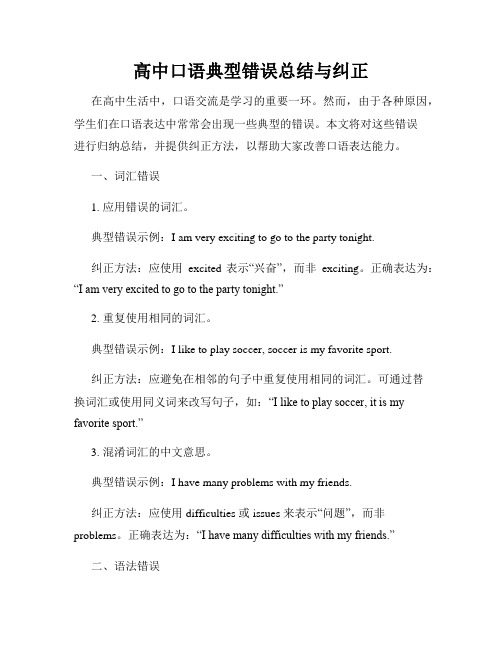
高中口语典型错误总结与纠正在高中生活中,口语交流是学习的重要一环。
然而,由于各种原因,学生们在口语表达中常常会出现一些典型的错误。
本文将对这些错误进行归纳总结,并提供纠正方法,以帮助大家改善口语表达能力。
一、词汇错误1. 应用错误的词汇。
典型错误示例:I am very exciting to go to the party tonight.纠正方法:应使用excited表示“兴奋”,而非exciting。
正确表达为:“I am very excited to go to the party tonight.”2. 重复使用相同的词汇。
典型错误示例:I like to play soccer, soccer is my favorite sport.纠正方法:应避免在相邻的句子中重复使用相同的词汇。
可通过替换词汇或使用同义词来改写句子,如:“I like to play soccer, it is my favorite sport.”3. 混淆词汇的中文意思。
典型错误示例:I have many problems with my friends.纠正方法:应使用 difficulties 或 issues 来表示“问题”,而非problems。
正确表达为:“I have many difficulties with my friends.”二、语法错误1. 主谓不一致。
典型错误示例:He don't like to study math.纠正方法:当主语为第三人称单数时,谓语动词需使用第三人称单数形式,即 don't 改为 doesn't。
正确表达为:“He doesn't like to study math.”2. 动词时态错误。
典型错误示例:Yesterday I see a movie with my friends.纠正方法:应根据具体时间来使用正确的动词时态。
英语口语表达中常见错误及纠正方法

英语口语表达中常见错误及纠正方法在学习英语口语的过程中,我们常常会犯一些错误。
这些错误可能是因为我们的母语对英语造成的干扰,也可能是因为我们对某些语法规则理解不深。
然而,只要我们能够意识到这些错误并努力加以纠正,我们的口语水平就会有所提高。
本文将介绍一些常见的错误,并提供相应的纠正方法。
一、错误:直译中文习惯用法在英语口语中,我们经常会受到中文思维的影响,习惯性地使用直译的中文表达方式。
这样的表达方式在英语中往往是错误的。
例如,我们在中文中常说“我很冷”,直译为英文就是“I am very cold”。
然而,正确的表达方式应该是“I feel very cold”。
纠正方法:要纠正这一错误,我们需要多接触、多练习地道的英语表达方式。
可以通过与英语母语人士交流、听英语广播或观看英语电影来提高自己的语感。
二、错误:混淆动词时态在英语中,动词时态的使用非常重要。
然而,很多人在口语表达中常常混淆动词时态,导致表达不准确。
例如,我们在中文中常说“我去过北京”,直译为英文就是“I have been to Beijing”。
然而,正确的表达方式应该是“I have gone to Beijing”。
纠正方法:要纠正这一错误,我们需要对各种动词时态的用法进行系统学习。
可以通过阅读相关的语法书籍、参加英语口语培训班等方式来提高自己的动词时态运用能力。
三、错误:使用错误的介词在英语中,介词的使用非常灵活,但也容易出错。
很多人在口语表达中常常使用错误的介词,导致表达不准确。
例如,我们在中文中常说“我对英语感兴趣”,直译为英文就是“I am interestedin English”。
然而,正确的表达方式应该是“I am interested in learning English”。
纠正方法:要纠正这一错误,我们需要对各种介词的用法进行系统学习。
可以通过背诵常用的介词短语、模仿英语母语人士的表达方式等方式来提高自己的介词运用能力。
纠正英语口语错误的技巧和方法

纠正英语口语错误的技巧和方法英语口语是学习英语的重要组成部分,但很多学习者在口语表达中常常会出现一些错误。
这些错误可能是因为语法、发音、词汇或者语用等方面的问题。
为了提高口语表达的准确性和流利度,我们需要掌握一些纠正英语口语错误的技巧和方法。
本文将介绍一些常见的错误类型,并提供相应的纠正方法。
一、语法错误的纠正语法错误是英语口语中最常见的错误之一。
学习者常常在句子结构、时态、语态等方面出现错误。
为了纠正这些错误,我们可以采取以下方法:1. 学习语法规则:掌握英语的基本语法规则是纠正语法错误的基础。
通过学习语法书籍、参加语法课程或者请教老师,我们可以加深对语法规则的理解,从而避免常见的语法错误。
2. 多做语法练习:通过做语法练习题,我们可以巩固所学的语法知识,并提高对语法规则的运用能力。
可以选择一些适合自己水平的练习题,如填空、改错等,有针对性地练习自己薄弱的语法点。
3. 反思和纠正:在口语交流中,我们要时刻注意自己的语法使用是否正确。
如果发现自己犯了语法错误,可以立即纠正,并反思错误的原因,避免再次犯同样的错误。
二、发音错误的纠正发音错误是英语口语中另一个常见的问题。
学习者常常在音标、音节、连读等方面出现错误。
为了纠正这些错误,我们可以采取以下方法:1. 学习音标:掌握国际音标是纠正发音错误的基础。
通过学习音标表和音标发音规则,我们可以准确地发出英语中的各个音素。
2. 听力训练:通过大量的听力训练,我们可以熟悉英语的语音特点,提高对英语发音的敏感度。
可以选择一些听力材料,如英语歌曲、英语电影等,反复听并模仿其中的发音。
3. 请教母语者:如果有机会,可以请教一些英语母语者帮助纠正发音错误。
他们可以给予及时的反馈和指导,帮助我们改正发音问题。
三、词汇错误的纠正词汇错误是英语口语中常见的问题之一。
学习者常常在词义、词形、词组搭配等方面出现错误。
为了纠正这些错误,我们可以采取以下方法:1. 扩大词汇量:通过大量的阅读和听力训练,我们可以积累更多的词汇。
口语中常见的错误及纠正方法

口语中常见的错误及纠正方法口语是我们生活中非常重要的一种交流方式,但是由于各种因素的影响,我们在口语表达时常常会犯一些错误。
本文将介绍口语中常见的错误,并提供相应的纠正方法,帮助大家提高口语表达的准确性和流利度。
一、语法错误语法错误是口语中最常见的问题之一。
以下是一些常见的语法错误及纠正方法。
1. 主谓一致错误错误示范:The book that I borrowed from the library are interesting.纠正示范:The book that I borrowed from the library is interesting.2. 动词时态错误错误示范:Yesterday, I go to the park with my friends.纠正示范:Yesterday, I went to the park with my friends.3. 冠词错误错误示范:I have a apple.纠正示范:I have an apple.4. 不恰当使用代词错误示范:She is older than me.纠正示范:She is older than I am.二、发音错误正确的发音对于口语表达至关重要。
以下是一些常见的发音错误及纠正方法。
1. 出现辅音连读错误错误示范:I want to go to the pa-rk.纠正示范:I want to go to the park.2. 弯舌音和卷舌音混淆错误示范:She can't dife-r the car.纠正示范:She can't drive the car.3. 母音发音错误错误示范:I will bike to my office.纠正示范:I will take my bike to the office.4. 重音错误错误示范:I can not un-derstand you.纠正示范:I can not understand you.三、词汇错误词汇错误会给人留下理解上的困惑,以下是一些常见的词汇错误及纠正方法。
初高中英语口语常见错误及改进方法
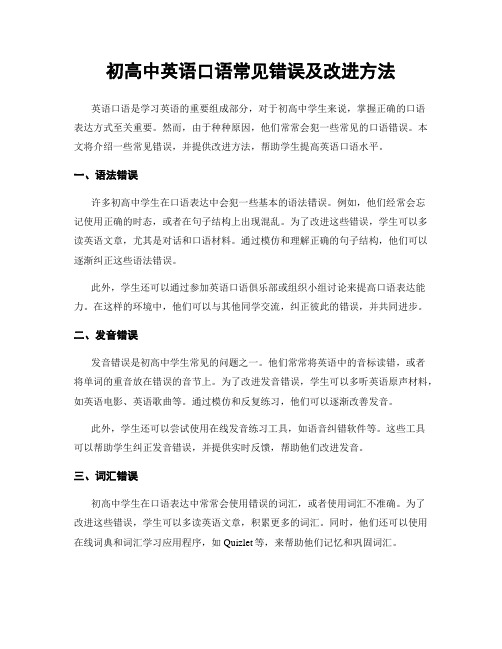
初高中英语口语常见错误及改进方法英语口语是学习英语的重要组成部分,对于初高中学生来说,掌握正确的口语表达方式至关重要。
然而,由于种种原因,他们常常会犯一些常见的口语错误。
本文将介绍一些常见错误,并提供改进方法,帮助学生提高英语口语水平。
一、语法错误许多初高中学生在口语表达中会犯一些基本的语法错误。
例如,他们经常会忘记使用正确的时态,或者在句子结构上出现混乱。
为了改进这些错误,学生可以多读英语文章,尤其是对话和口语材料。
通过模仿和理解正确的句子结构,他们可以逐渐纠正这些语法错误。
此外,学生还可以通过参加英语口语俱乐部或组织小组讨论来提高口语表达能力。
在这样的环境中,他们可以与其他同学交流,纠正彼此的错误,并共同进步。
二、发音错误发音错误是初高中学生常见的问题之一。
他们常常将英语中的音标读错,或者将单词的重音放在错误的音节上。
为了改进发音错误,学生可以多听英语原声材料,如英语电影、英语歌曲等。
通过模仿和反复练习,他们可以逐渐改善发音。
此外,学生还可以尝试使用在线发音练习工具,如语音纠错软件等。
这些工具可以帮助学生纠正发音错误,并提供实时反馈,帮助他们改进发音。
三、词汇错误初高中学生在口语表达中常常会使用错误的词汇,或者使用词汇不准确。
为了改进这些错误,学生可以多读英语文章,积累更多的词汇。
同时,他们还可以使用在线词典和词汇学习应用程序,如Quizlet等,来帮助他们记忆和巩固词汇。
另外,学生还可以通过参加英语角或者与外教进行交流来提高词汇运用能力。
在与母语为英语的人交流的过程中,他们可以学习正确的词汇用法,并加深对词汇的理解。
四、缺乏流利度许多初高中学生在口语表达中缺乏流利度,常常会停顿或者卡壳。
为了提高流利度,学生可以多进行口语练习。
他们可以找一个语伴,定期进行口语交流,或者参加口语训练班。
通过反复练习,他们可以逐渐提高口语表达的流利度。
此外,学生还可以多听英语广播或者英语播客,模仿主持人的语速和语调。
英语口语中的纠错原则
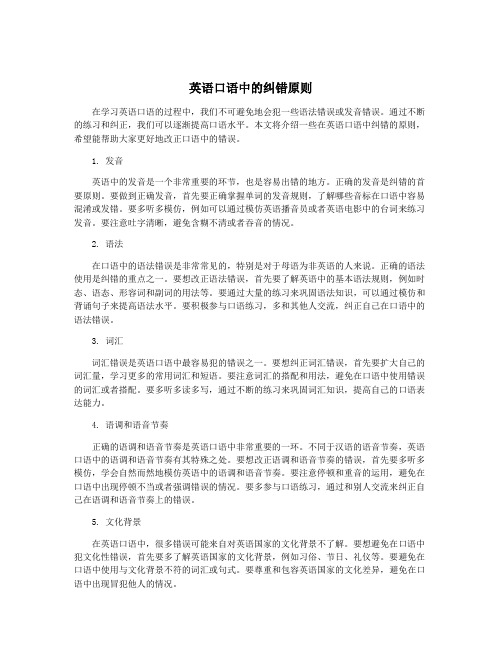
英语口语中的纠错原则在学习英语口语的过程中,我们不可避免地会犯一些语法错误或发音错误。
通过不断的练习和纠正,我们可以逐渐提高口语水平。
本文将介绍一些在英语口语中纠错的原则,希望能帮助大家更好地改正口语中的错误。
1. 发音英语中的发音是一个非常重要的环节,也是容易出错的地方。
正确的发音是纠错的首要原则。
要做到正确发音,首先要正确掌握单词的发音规则,了解哪些音标在口语中容易混淆或发错。
要多听多模仿,例如可以通过模仿英语播音员或者英语电影中的台词来练习发音。
要注意吐字清晰,避免含糊不清或者吞音的情况。
2. 语法在口语中的语法错误是非常常见的,特别是对于母语为非英语的人来说。
正确的语法使用是纠错的重点之一。
要想改正语法错误,首先要了解英语中的基本语法规则,例如时态、语态、形容词和副词的用法等。
要通过大量的练习来巩固语法知识,可以通过模仿和背诵句子来提高语法水平。
要积极参与口语练习,多和其他人交流,纠正自己在口语中的语法错误。
3. 词汇词汇错误是英语口语中最容易犯的错误之一。
要想纠正词汇错误,首先要扩大自己的词汇量,学习更多的常用词汇和短语。
要注意词汇的搭配和用法,避免在口语中使用错误的词汇或者搭配。
要多听多读多写,通过不断的练习来巩固词汇知识,提高自己的口语表达能力。
4. 语调和语音节奏正确的语调和语音节奏是英语口语中非常重要的一环。
不同于汉语的语音节奏,英语口语中的语调和语音节奏有其特殊之处。
要想改正语调和语音节奏的错误,首先要多听多模仿,学会自然而然地模仿英语中的语调和语音节奏。
要注意停顿和重音的运用,避免在口语中出现停顿不当或者强调错误的情况。
要多参与口语练习,通过和别人交流来纠正自己在语调和语音节奏上的错误。
5. 文化背景在英语口语中,很多错误可能来自对英语国家的文化背景不了解。
要想避免在口语中犯文化性错误,首先要多了解英语国家的文化背景,例如习俗、节日、礼仪等。
要避免在口语中使用与文化背景不符的词汇或句式。
高中口语中常见的语法错误与纠正方法
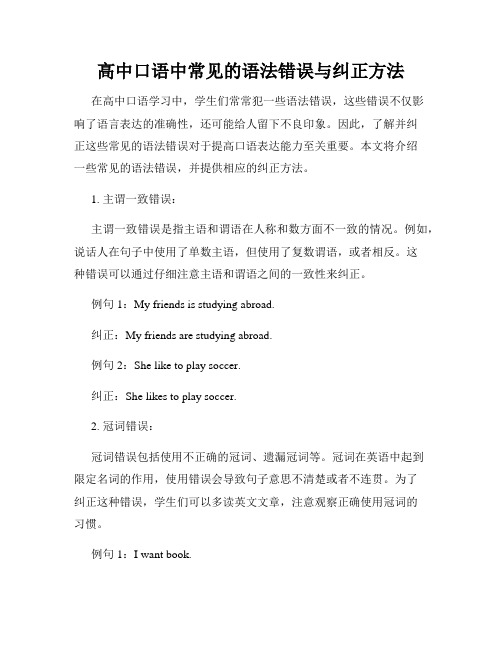
高中口语中常见的语法错误与纠正方法在高中口语学习中,学生们常常犯一些语法错误,这些错误不仅影响了语言表达的准确性,还可能给人留下不良印象。
因此,了解并纠正这些常见的语法错误对于提高口语表达能力至关重要。
本文将介绍一些常见的语法错误,并提供相应的纠正方法。
1. 主谓一致错误:主谓一致错误是指主语和谓语在人称和数方面不一致的情况。
例如,说话人在句子中使用了单数主语,但使用了复数谓语,或者相反。
这种错误可以通过仔细注意主语和谓语之间的一致性来纠正。
例句1:My friends is studying abroad.纠正:My friends are studying abroad.例句2:She like to play soccer.纠正:She likes to play soccer.2. 冠词错误:冠词错误包括使用不正确的冠词、遗漏冠词等。
冠词在英语中起到限定名词的作用,使用错误会导致句子意思不清楚或者不连贯。
为了纠正这种错误,学生们可以多读英文文章,注意观察正确使用冠词的习惯。
例句1:I want book.纠正:I want a book.例句2:Can you give me advice?纠正:Can you give me some advice?3. 时态错误:时态错误是指句子中所使用的动词时态与需要表达的时间不一致。
为了纠正这种错误,学生们应该熟悉各种时态的用法,并根据句子所表示的时间来选择正确的时态。
例句1:I go to the movies yesterday.纠正:I went to the movies yesterday.例句2:He will go to the party tomorrow.纠正:He is going to the party tomorrow.4. 句子结构错误:句子结构错误包括错误的主谓宾结构、缺乏连词或者连接词的使用不当等。
为了纠正这种错误,学生们可以多做语法练习,积累正确的句子结构和固定搭配。
高二口语表达的常见错误及改正

高二口语表达的常见错误及改正口语表达是与他人进行有效沟通所必需的技能之一。
在高二的学习过程中,很多同学可能会出现一些常见的口语表达错误。
本文将列举一些常见错误,并提出改正的方法,以帮助同学们提高口语表达能力。
一、语法错误1.主谓不一致:主语与谓语动词在人称和数方面不一致。
错误示例:My mother have a cat.正确示例:My mother has a cat.改正方法:要注意主语和谓语动词的一致性。
单数主语应使用单数谓语动词,复数主语则应使用复数谓语动词。
2.时态错误:在表达过去、现在及将来的动作时,使用错误的时态。
错误示例:I will went to the park yesterday.正确示例:I went to the park yesterday.改正方法:要根据具体的时间判断使用正确的时态。
过去的动作使用过去时态,现在的动作使用现在时态,将来的动作使用将来时态。
3.冠词错误:使用错误的冠词或者省略了应该使用的冠词。
错误示例:I want drink water.正确示例:I want to drink water.改正方法:要根据名词前的词性、数量和特定搭配等情况来决定使用哪种冠词或省略。
二、发音错误1.元音发音错误:错误地发音元音音素。
错误示例:I want to learn Eblish.正确示例:I want to learn English.改正方法:要注意学习正确的元音发音,通过对比母语和目标语言的发音并加强练习来改正。
2.辅音发音错误:错误地发音辅音音素。
错误示例:I can't find my lucker.正确示例:I can't find my locker.改正方法:要注意学习正确的辅音发音,特别是一些与母语不同的辅音音素。
3.连读错误:没有正确进行连读,导致单词读音不流畅。
错误示例:I don't know how to speak in Eng_lish.正确示例:I don't know how to speak in English.改正方法:要学习和掌握正确的连读规则,如适当地进行辅音连读、元音连读等。
英语口语表达中的语法错误与纠正方法
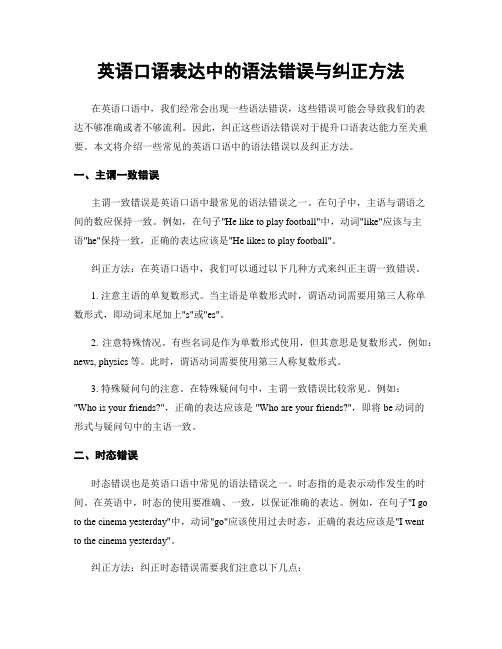
英语口语表达中的语法错误与纠正方法在英语口语中,我们经常会出现一些语法错误,这些错误可能会导致我们的表达不够准确或者不够流利。
因此,纠正这些语法错误对于提升口语表达能力至关重要。
本文将介绍一些常见的英语口语中的语法错误以及纠正方法。
一、主谓一致错误主谓一致错误是英语口语中最常见的语法错误之一。
在句子中,主语与谓语之间的数应保持一致。
例如,在句子"He like to play football"中,动词"like"应该与主语"he"保持一致,正确的表达应该是"He likes to play football"。
纠正方法:在英语口语中,我们可以通过以下几种方式来纠正主谓一致错误。
1. 注意主语的单复数形式。
当主语是单数形式时,谓语动词需要用第三人称单数形式,即动词末尾加上"s"或"es"。
2. 注意特殊情况。
有些名词是作为单数形式使用,但其意思是复数形式,例如:news, physics等。
此时,谓语动词需要使用第三人称复数形式。
3. 特殊疑问句的注意。
在特殊疑问句中,主谓一致错误比较常见。
例如:"Who is your friends?",正确的表达应该是 "Who are your friends?",即将be动词的形式与疑问句中的主语一致。
二、时态错误时态错误也是英语口语中常见的语法错误之一。
时态指的是表示动作发生的时间。
在英语中,时态的使用要准确、一致,以保证准确的表达。
例如,在句子"I go to the cinema yesterday"中,动词"go"应该使用过去时态,正确的表达应该是"I went to the cinema yesterday"。
纠正方法:纠正时态错误需要我们注意以下几点:1. 弄清楚动作的发生时间。
高中英语口语语法和表达准确性
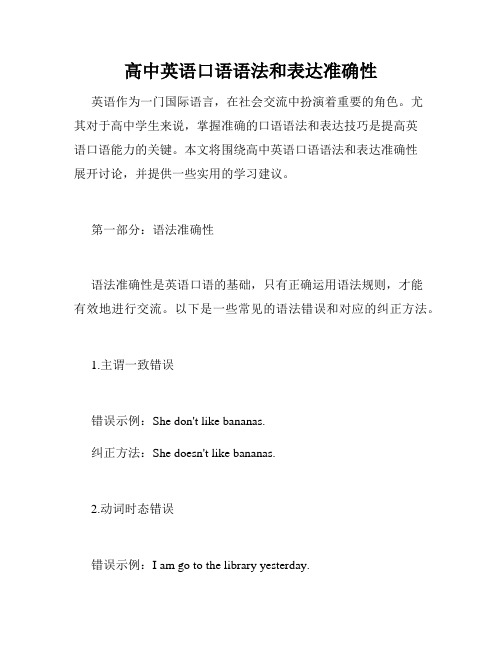
高中英语口语语法和表达准确性英语作为一门国际语言,在社会交流中扮演着重要的角色。
尤其对于高中学生来说,掌握准确的口语语法和表达技巧是提高英语口语能力的关键。
本文将围绕高中英语口语语法和表达准确性展开讨论,并提供一些实用的学习建议。
第一部分:语法准确性语法准确性是英语口语的基础,只有正确运用语法规则,才能有效地进行交流。
以下是一些常见的语法错误和对应的纠正方法。
1.主谓一致错误错误示例:She don't like bananas.纠正方法:She doesn't like bananas.2.动词时态错误错误示例:I am go to the library yesterday.纠正方法:I went to the library yesterday.3.冠词错误错误示例:I want a apple.纠正方法:I want an apple.4.代词使用错误错误示例:Him is my best friend.纠正方法:He is my best friend.为了避免以上错误,学生们可以通过多阅读、多听英语材料,加强对语法规则的理解和运用。
此外,语法练习题和语法参考书也是提高语法准确性的有效工具。
第二部分:表达准确性除了语法准确性,英语口语的表达准确性也非常重要。
下面是一些提高表达准确性的方法。
1.积累词汇量词汇量的丰富与否直接影响到表达的准确性。
学生们可以通过背单词、读英文文章等方式来积累词汇量。
同时,了解词汇的用法和搭配也是十分重要的。
2.注意语音语调正确的语音语调能够帮助我们更清晰地表达自己的意思。
学生们可以通过模仿英语原生者的发音,尤其是重音和连读的运用,来提高口语表达的准确性。
3.准确使用习语和口语表达习语和口语表达在真实的交流中非常常见,但其用法也往往比较灵活多变。
学生们可以通过听英文歌曲、观看英文电影等方式,了解并积累常用的习语和口语表达。
总结:高中英语口语的语法准确性和表达准确性对于学生们来说都是非常重要的。
英语口语中的纠错原则
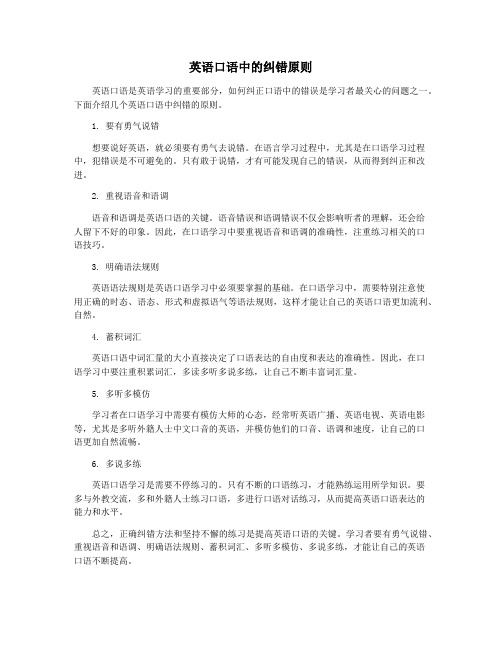
英语口语中的纠错原则英语口语是英语学习的重要部分,如何纠正口语中的错误是学习者最关心的问题之一。
下面介绍几个英语口语中纠错的原则。
1. 要有勇气说错想要说好英语,就必须要有勇气去说错。
在语言学习过程中,尤其是在口语学习过程中,犯错误是不可避免的。
只有敢于说错,才有可能发现自己的错误,从而得到纠正和改进。
2. 重视语音和语调语音和语调是英语口语的关键。
语音错误和语调错误不仅会影响听者的理解,还会给人留下不好的印象。
因此,在口语学习中要重视语音和语调的准确性,注重练习相关的口语技巧。
3. 明确语法规则英语语法规则是英语口语学习中必须要掌握的基础。
在口语学习中,需要特别注意使用正确的时态、语态、形式和虚拟语气等语法规则,这样才能让自己的英语口语更加流利、自然。
4. 蓄积词汇英语口语中词汇量的大小直接决定了口语表达的自由度和表达的准确性。
因此,在口语学习中要注重积累词汇,多读多听多说多练,让自己不断丰富词汇量。
5. 多听多模仿学习者在口语学习中需要有模仿大师的心态,经常听英语广播、英语电视、英语电影等,尤其是多听外籍人士中文口音的英语,并模仿他们的口音、语调和速度,让自己的口语更加自然流畅。
6. 多说多练英语口语学习是需要不停练习的。
只有不断的口语练习,才能熟练运用所学知识。
要多与外教交流,多和外籍人士练习口语,多进行口语对话练习,从而提高英语口语表达的能力和水平。
总之,正确纠错方法和坚持不懈的练习是提高英语口语的关键。
学习者要有勇气说错、重视语音和语调、明确语法规则、蓄积词汇、多听多模仿、多说多练,才能让自己的英语口语不断提高。
英语口语交流中的语法错误与纠正方法

英语口语交流中的语法错误与纠正方法在日常的英语口语交流中,难免会出现一些语法错误。
这种错误可能会导致对话的理解困难,甚至产生误解。
因此,了解常见的语法错误,并掌握纠正的方法,对提高英语口语交流的准确性非常重要。
本文将介绍一些常见的语法错误,并提供相应的纠正方法,帮助大家提高英语口语交流的水平。
1. 主谓一致错误:在英语中,主语和谓语应该在人称和数上保持一致。
许多学习者在口语交流中容易忽视这一点,导致主谓不一致的错误。
例如,错误的表达为:- The students is studying hard.- My sister and her friends is going to the party.正确的纠正方式为:- The students are studying hard.- My sister and her friends are going to the party.2. 冠词错误:在英语中,正确的冠词使用对于句子的准确性至关重要。
有时候,学习者可能会误用冠词,或者忽视需要添加冠词的情况。
例如,错误的表达为:- Can you give me advice?- I want to buy car.正确的纠正方式为:- Can you give me some advice?- I want to buy a car.3. 时态错误:在英语口语交流中,正确使用时态可以让对话更加准确地表达时间关系。
然而,学习者常常容易混淆不同的时态形式。
例如,错误的表达为:- Yesterday, I go to the cinema.- I will see my friends tomorrow.正确的纠正方式为:- Yesterday, I went to the cinema.- I am going to see my friends tomorrow.4. 主动语态和被动语态错误:英语中常用的动词形式包括主动语态和被动语态。
高中英语口语中的常见错误与纠正方法
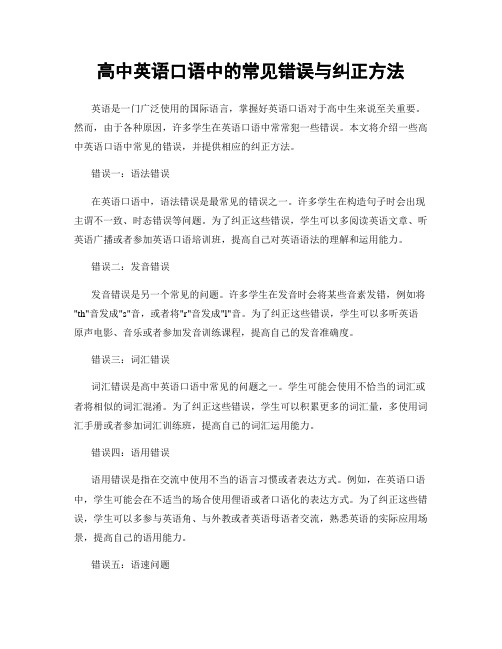
高中英语口语中的常见错误与纠正方法英语是一门广泛使用的国际语言,掌握好英语口语对于高中生来说至关重要。
然而,由于各种原因,许多学生在英语口语中常常犯一些错误。
本文将介绍一些高中英语口语中常见的错误,并提供相应的纠正方法。
错误一:语法错误在英语口语中,语法错误是最常见的错误之一。
许多学生在构造句子时会出现主谓不一致、时态错误等问题。
为了纠正这些错误,学生可以多阅读英语文章、听英语广播或者参加英语口语培训班,提高自己对英语语法的理解和运用能力。
错误二:发音错误发音错误是另一个常见的问题。
许多学生在发音时会将某些音素发错,例如将"th"音发成"s"音,或者将"r"音发成"l"音。
为了纠正这些错误,学生可以多听英语原声电影、音乐或者参加发音训练课程,提高自己的发音准确度。
错误三:词汇错误词汇错误是高中英语口语中常见的问题之一。
学生可能会使用不恰当的词汇或者将相似的词汇混淆。
为了纠正这些错误,学生可以积累更多的词汇量,多使用词汇手册或者参加词汇训练班,提高自己的词汇运用能力。
错误四:语用错误语用错误是指在交流中使用不当的语言习惯或者表达方式。
例如,在英语口语中,学生可能会在不适当的场合使用俚语或者口语化的表达方式。
为了纠正这些错误,学生可以多参与英语角、与外教或者英语母语者交流,熟悉英语的实际应用场景,提高自己的语用能力。
错误五:语速问题在英语口语中,学生可能会因为紧张或者缺乏自信而导致语速过快或者过慢。
语速过快可能会导致发音不准确,语速过慢可能会影响交流的流畅性。
为了纠正这些错误,学生可以通过模仿英语原声录音、参加朗读比赛或者进行口语训练,提高自己的语速控制能力。
错误六:缺乏表达能力有些学生在英语口语中可能会遇到词穷或者思维跳跃的问题,导致表达不清晰或者无法连贯地表达自己的意思。
为了纠正这些错误,学生可以多进行口语练习,例如进行辩论、演讲或者参加英语角活动,提高自己的表达能力和思维逻辑能力。
英语课堂口语的纠错艺术
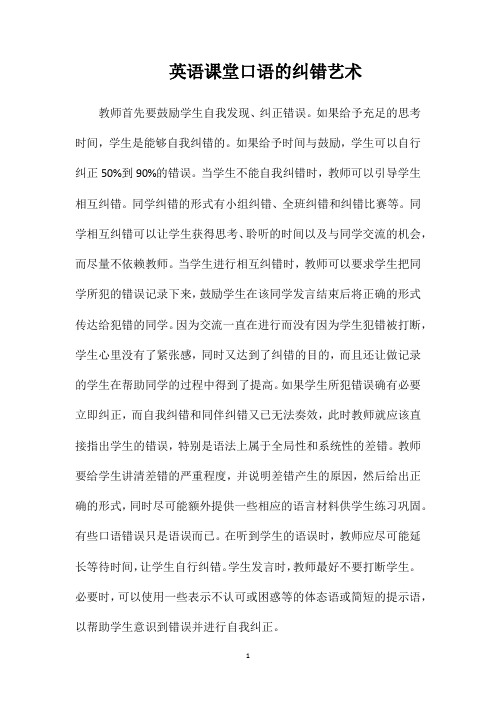
英语课堂口语的纠错艺术
教师首先要鼓励学生自我发现、纠正错误。
如果给予充足的思考时间,学生是能够自我纠错的。
如果给予时间与鼓励,学生可以自行纠正50%到90%的错误。
当学生不能自我纠错时,教师可以引导学生相互纠错。
同学纠错的形式有小组纠错、全班纠错和纠错比赛等。
同学相互纠错可以让学生获得思考、聆听的时间以及与同学交流的机会,而尽量不依赖教师。
当学生进行相互纠错时,教师可以要求学生把同学所犯的错误记录下来,鼓励学生在该同学发言结束后将正确的形式传达给犯错的同学。
因为交流一直在进行而没有因为学生犯错被打断,学生心里没有了紧张感,同时又达到了纠错的目的,而且还让做记录的学生在帮助同学的过程中得到了提高。
如果学生所犯错误确有必要立即纠正,而自我纠错和同伴纠错又已无法奏效,此时教师就应该直接指出学生的错误,特别是语法上属于全局性和系统性的差错。
教师要给学生讲清差错的严重程度,并说明差错产生的原因,然后给出正确的形式,同时尽可能额外提供一些相应的语言材料供学生练习巩固。
有些口语错误只是语误而已。
在听到学生的语误时,教师应尽可能延长等待时间,让学生自行纠错。
学生发言时,教师最好不要打断学生。
必要时,可以使用一些表示不认可或困惑等的体态语或简短的提示语,以帮助学生意识到错误并进行自我纠正。
总之,在口语课堂上教师应该对学生错误的严重程度及产生错误的原因进行认真分析,充分把握好纠错的时机,采取灵活多样的纠错策略,帮助学生克服因错误的出现而造成的语言障碍,发展口语纠错能力、提高口语水平。
- 1、下载文档前请自行甄别文档内容的完整性,平台不提供额外的编辑、内容补充、找答案等附加服务。
- 2、"仅部分预览"的文档,不可在线预览部分如存在完整性等问题,可反馈申请退款(可完整预览的文档不适用该条件!)。
- 3、如文档侵犯您的权益,请联系客服反馈,我们会尽快为您处理(人工客服工作时间:9:00-18:30)。
【标题】高中英语课堂口语纠错方法【作者】冉军【关键词】错误;失误;纠错原则;纠错方法【指导老师】马小燕【专业】英语【正文】Ⅰ.IntroductionNew Curriculum emphasizes student self-cooperative learning, so students have more and more opportunities to use English in the classroom. In English class, some students will make errors when they communicate with the teacher or classmates. The traditional view is that: Student's "wrong" are derived from the mother tongue interference, a "mistake", said the failure of learning, reflecting the improper way of learning. "Wrong" must not be tolerant by teachers, and must immediately be corrected. But in teaching practice, if these errors must be corrected by the teachers, it is bound to undermine the students’ oral communication initiative, hurt their self-esteem, and affect fluency. However, if teachers do not pay more attention to their errors and correct them promptly, students will be likely to make errors again. They can not always grasp the correct grammar rules, why do students make errors? What kind of errors teachers should correct? How to correct? How to guide students to correct errors in spoken language training by themselves? About these problems, this paper will analyze the causes of students making errors, the principles of error correction and the ways of error correction, to explore the errors correction techniques in English class.Ⅱ. Definition of errorsWhat is an error in language learning? Different researchers give different definitions to it.According to Corder S.P. (1967, cited in Ellis,1999), “an error is a deviation in learner language which results from lack of knowledge”3.An error can be overt (the deviation is apparent in the surface form of the utterance) or covert (the deviation is only evident when the learner’s meaning is taken into account).Corder (1973) also makes a distinction between errors,lapses and mistakes.Errors are not recognizable. Such lapses are not failing and so are sometimes referred to as ‘performance errors’(Allwright et al,1991:88).Mistakes in Corder’s scheme are what he calls‘inappropriate utterances’, where there is a failure to match the language to the situation.A further useful distinction is offered by Edge,who subdivides Cor der’s category intotwo.He retains the term ‘error’ for items that the learners cannot self-correct but to which they have been exposed,offering theterm ‘attempts’ for deviations in areas of language still untaught.Based On Corder’s distinction,James (2001) refines the definition of error as “being an instance of language that is unintentionally deviant and is not self-corrigible by its author”4.A mistake is intentionally or unintentionally deviant and self-corrigible.Brown (2000:205)defined error and mistake as follows:A mistake refers to a performance error that is either a random guess or a slip in that it is a failure to utilize a known system correctly.It occurs when learners fail to perform their competence.It's a performance phenomenon resulting from slip of tongue,memory limitation,or lack of linguistic planning and strategy.All people make mistake,in both native and second language situation.Native speakers are normally capable of recognizing and correcting such lapses or mistakes, which are not the result of a deficiency in competence but the result of some sort of breakdown or imperfection in the process of producing speech.An error is a noticeable deviation from the adult grammar of a native speaker, reflecting the interlanguage competence of the learner.An error reveals a portion of his competence in the target language.Comparing the definitions made by Corder and Brown, we can find that Brown’s mistake is similar to Corder’s lapse,and Corder’s mistake is what we call pragmatic failure,and Brow n’s definition of error is too limited in grammar.But there is a common thing,which is that mistake is not the reflection of deficiency in language knowledge,but just a failure in performance.According to Geoge (1972,cited in Allwright et al,1991:85),“In formal classroom instruction of second or foreign languages,the teacher’s response to students’ utterances may be the most important criterion for judging error.Indeed,one definition states that an error is a form unwanted by the teacher"5.Another explanation was given by Chaudron (1986,cited in Allwright et al,1991:86) in his study of teachers’ reaction to children’s errors.He defined errors as(1) linguistic forms or content that differed from native speaker norms or facts;(2) any other behavior signaled by the teacher as needing improvement.However,both “unwanted form” and"behavior that needs improvement" seem to illustrate quite ambiguous concepts.Indeed,it is found in some transcripts of classroom discourse that learners’ response are sometimes rejec ted or signaled to be improved by teachers--not because they are wrong but because they are unexpected.In a word, a mistake refers to a performance error that is either a random guess or a ‘slip of tongue’, and it is a failure performance to a known system.6 Everyone makes mistakes, no matter in a native language or in a foreign language .As we can see that a mistake has nothing to do with thelanguage competence, but a result from a temporary breakdown. When a mistake is challenged or given enough attention, it can be self-corrected. An error, on the other hand, has direct relation with the learners’ language competence. Errors do not result from carelessness nor hesitation, but lack of knowledge in the target language. Language errors cannot beself-corrected no matter how much attention is given.Ⅲ. Previous Study of Error CorrectionThough whether errors should be corrected has long been a controversial question, the researches on error treatment in class have been carried out by a lot of researchers.1 They can be divided into three groups:one is about what teachers and students actually do in the classroom when language errors occur, and there is a considerable body of work done on this (Chaudron 1988,Allwright and Bailey 1991);the second is concerning a bout the learners’ attitudes towards error treatment,and much work has been done onthis ( Cathcart and Olsen 1976,Chenoweth et a1.1983);the third is that what types of teacher intervention is most effective in counteracting errors.As for the researches in the first group,Chaudron (1988,cited in Ellis,1999:584) reviews a number of students that have investigated what teachers actually do in the classroom (Salica1981;Courchene 1980;Chaudron1986;Fanselow 1977;Lucas 1975). The main conclusions he gets are that certain types of errors are much more likely to be treated than others:discourse,content, and lexical errors receive more attention than phonological or grammatical errors;and that there is considerable variation among teachers regarding how frequently error treatment takes place.Edmondson(1985) has also pointed out that teachers sometimes correct ‘errors’ that have not in fact been made.As for the second group,Cathcert and Olsen (1976) find that ESL learners like to be corrected by their teachers and want more corrected than they are usually provided with.Chenoweth et a1(1983) find learners like to be corrected not only in form-focused activities,but also when they are talking with native speakers.As for the third group,Lyster and Ranta (1997) provide us with a correction strategy that they think is the most effective.In a study by them, they determine six different oral error correction strategies:explicit error correction(teacher provides correct form);recasts (teacher reformulates utterance minus the error),clarification requests (teacher indicates the need for clarification),metalinguistic feedback (teacher comments without providing correct form),elicitation(ask students to reformulate response) and repetition (teacher repeats,in isolation,the stude nt’s error).Lyster and Ranta’s research shows that the recast strategy is used most often,but this strategy also proves to be the least effective, because it does not require the student to attempt to correct his or her own error.Four of the other six methods of feedback require the students togenerate a correct answer.Lyster and Ranta find that the four types of feedback that allow for negotiation of meeting (elicitation,meta-linguistic feedback,clarification requests and repetition) are more likely to lead to students correcting their own errors than are recasts or explicit corrections. The research of Lyster and Ranta indicates that elicitation is most effective strategy because it requires students to elaborate on the message conveyed,and the process that leads to the correct answer.2Ⅳ. The Reasons of Making ErrorThere are many reasons that cause students to make language errors. A number of factors in teaching are likely to be the incentive for students to make language errors. This paper will introduce the reasons from the five aspects: the lack of knowledge, mother-tongue interference,over-generalization, environmental factors and language communication factors.A. Lacking of knowledgeThey make errors because they lack knowledge of English. English language has a long history. Its grammar and vocabulary are very huge. It should be a very long time to learn it well for our beginners in China. If we want to speak or write something in English, we must know enough about the language, the culture, the geography and the history of England. But many English teachers in China stress the importance of speaking too early. Because the beginners haven’t learned English for a long time, there are not enough materials made up in English in most beginners’ minds. So in order to deal with their teachers’ requirements for speaking in English, they have to translate what they want to say word by word. Negative transfers make them make a lot of mistakes. Perhaps some teachers do not think it serious, they may think as time goes on their errors will become fewer and fewer. But this author think errors can form wrong languagehabit-formation.B. Mother-Tongue InterferenceThere are two kinds of migrations of English mother tongue: one is the mother tongue and English in forms and regulations being mistaken to the similarity for the same line. For example, the syntactic structure of English Subject, Predicate, Object and Chinese are basically the same. After students to do more practice, they would be natural to equate English syntactic structure and Chinese syntactic structure. In consequence, they usually make structural errors in the future learning process and speak in Chinglish. The other is that the mother tongue and English are mistaken to similarity in spite of their different forms and rules.C. Over-GeneralizationGeneralization is a common method in English learning. Over-generalization refers to that students surpass over the scope of rules. This leads to what they speak or write going beyond the acceptable range. In English learning,students make errors which are not meet English conventions because of their over-generalization. Such cases are not infrequent. For example, after learning the rules of the noun plural, students is likely to regard the plural of the word “German” as“Germen” according to the plural of the two words “man” and“woman”. Such errors are caused due to over-generalization.D. Environmental FactorsAs they do not live in English-spoken countries, their sense for English is not very strong. To most of beginners in China, they just learn how to speak and write in English in classes. After school, their friends, parents, neighbors all speak Chinese, sometimes their teachers’ English is very poor. In such environments their sense of English can not become very strong in a short time mostly. Most beginners still think in their native language. When they want to express their views in English they have to draw support from Chinese. A few years ago it was worse because most beginners didn’t have recorders, CDs. They even can not afford to see English films. So the environment around the beginners makes their sense of English poor. And poor sense of English makes them often to make errors.Ⅴ. Principles of Correcting Students’ ErrorsAll students at different stages of language learning will make errors, and making errors is a natural part of the learning process, and students’ communicative competence is the development of normal situation. As a teacher, if they criticize their students sharply it will a harm the interest and enthusiasm of the student in learning. Therefore, teachers should be amiable, humor, and considerable the feelings of the students when point out the errors and the teacher should avoiding beginning with something like "I have said many times, you still make errors", "how you make such error", etc. This makes the original "sound" of the classroom into a "silent" class. Therefore, we should concentrate on implementing the following four principles.A. To treat students’ errors pa tiently and help building self-confidence Dulay & Burt (1974) said: "If students don’t make mistakes he can not learn the language well."7 The process of language learning itself is a gradual, long-term accumulation and practice, and constantly wrong process. When one student makes error, teachers should treated them with generosity .Teachers should pay attention to protect students’self-esteem. Try to avoid publicly criticizing the student, tactful to point out the errors, but more certain strengths, achievements and progress, we must make full use of motivating language, such as: "Try again", "Try your best", "Do not give up "," I'm sure you can. "," I think you can do it "and so on to encourage students to try to alleviate the psychological burden, For the poor student, the teacher will give more patience, enthusiasm and love, more praise and encouragement, concern, thus helping the speaker to establish self-confidence, gradually reduce errors to avoidevery mistake corrected.B. To distinguish global errors from local errorsOverall error refers to the use of major components of sentence structure errors, leading to sentences or words difficult to understand or not understand. For example, the word order reversed, with the misuse or leakage connectives, syntax, and so over-generalization. Such as: I like take taxi but my friend said so not that we should be late for school. Sentence, the subject has been wrong, it is difficult to understand it, which is part of the overall errors. Such errors should be corrected in time, because the speaker’s information provided with ambiguous, which makes the exchange not to be conducted smoothly. Partial error refers to the ingredients in the use of sentence structure errors, but caused no understand problem. For example, misuse or omitted by the suffix of a verb or a noun form, definite article, or auxiliaries and so on. Such as: There are long trees on each side of the street. Although the sentence used the wrong adjective "long", but the meaning is clear. Localized errors usually do not need to correct, because the speaker is very clear what the information provided, while the correction may interrupt the flow of language learners communicative output.C. To treat systematic errors and mistakes differentlySystematic error refers to the errors learners have not yet mastered, or not yet fully mastered the usage of the word. It is also known as language competence error. These errors will repeat again and again in the study and applying language. Learners are usually difficult to detect and correct the errors by themselves. For example, students are likely to say that “The girl dreamed to become a famous singer.”This is because they failed to grasp this structure of “dream of doing sth.”Language mistakes refer to the faulty language output which is caused by certain emotional factors such as fatigue, carelessness, or distraction, and environmental factors. Mistakes have also been known as performance mistakes. For example: She is my uncle. Because of "slip of the tongue" the speaker changes “He” into “She”. Such mistakes are accidental. Because there was no proper use of their prior language knowledge, learners in general can quickly recognize and correct them by themselves.D. To grasp the opportunity of the error correctionCorrecting errors in an English class is a common teaching activity for teachers, but they should grasp the time of error correction, namely, when to immediately correct, and when to delay correction. First of all, teachers should understand the severity of errors. If the errors students committee is too deviate from the correct form and has seriously affected the understanding, expression and communication. Teachers should point them out and corrected them; if it is not this kind of case, teachers can delay the correction and give after-school tutorial. Secondly, teachers should correct errors according to different class types and purposes of teachingactivities. If the teaching activities are designed to develop students ability to express verbally teachers should not correct when students speaking so as to avoid the psychological stress of students, affecting their expression of fluency. Teachers should point out the overall errors or systematic errors and give the correct form of expression at the end of the student's speech. If the teaching activities focus on the accuracy of grammar and other language projects, teachers should point out the errors timely and correct them. At the same time, teachers should provide some appropriate additional language materials as much as possible for students to practice and consolidate what they have learned.Ⅵ. The Ways of Error CorrectionTeachers do not expect students to express without any error but allow them to make errors. Teachers should be tolerant and patie nt to students’ errors so as to make them confident in their speaking. When correcting errors teachers need to master certain strategies and methods to not only maintain students’ self-esteem, interest and passion in learning, but also to enable students to master the correct language. Therefore, teachers must be very careful to correct errors. Their response to students’ errors has a direct impact on teaching effectiveness and students’ learning initiative. According to some linguists, the author put forward some ways of error correction.A. Direct correctionDirect error correction refers to that the teacher interrupts students and say the correct form of language and allow them to correct when they make errors. This way of correction is commonly used in mechanical drillings designed to enable students to master the correct form of language or in a variety of exercises focusing on accurate output of language (Mu Jin Jiang, 2004)8. The terms of direct correction teachers usually use in the classroom are: You should say…/ No, you shouldn't say that. / Read after me. / Pay attention to…/ Oh, you mean…/ .We don’t say…in English. We say…and so on.For Example :T: What did you have for breakfast this morning?S: I have a bottle of milk, an egg and two cakes.T: Oh. You should say “I had a bottle of milk…”Read after me, please.S: Oh, sorry. I had a bottle of milk, an egg and two cakes.B. RecastsRestatement is that teachers correct errors implicitly. This is a kind of moderate error correction. This way is based on students’ expression. Teachers correct some ingredients or words but maintain the original meaning of the expression (Ni Wenjun,2004). It is very effective to correct grammatical errors in oral language.First Example:S: He is watch TV.(firs-time expression)T: He is watch TV ? Patrick is watching a football game on TV.(restate)S: He is watching TV.(second-time expression)T: Right. Go on please.S: She’s do one homework.(firs-time expression)T: She’s doing her homework.(restate)Oh, she has a lot of homework to do.S: She’s doing her homework.(second-time expression)Second Example:S: I think that the worm will go under the soil.(firs-time expression)T: I think that the worm will go under the soil?S: …(no answer)T: I thought that the worm would go under the soil.(restate)S: I thought that the worm would go under the soil.(second-time expression)C. PinpointingTeachers repeat the words of students with stress or an emphasis on the problem in a rising tone. Chaudro (1988, cited in James, 2001).This way can not only correct the errors of students but also take their self-esteem into account and improve their interest in oral activities.First Example:S: I am going in Beijing.T: I am going IN (?) Beijing?S: I am going to Beijing.Second Example:T: Where did you spend your holiday this summer?S: I go to Qingdao for my holiday.T: You GO (?) to Qingdao?S: Oh, I went to Qingdao for my holiday.D. ElicitationTeachers inspire students to correct the error through the following ways: ⑴ to ask questions on the wrong part, such as "How do we say ... in English ?" with low speed and pause; ⑵ to use facial expression or gesture to indicate that he/she can continue; ⑶ to provide several related options available for students to choose; ⑷ if the student is still unable to tell the correct form, then ask another student to give a hand.First Example:T: Excuse me, what is she doing?S1: She is cleaning a class.T: She is cleaning a class? (pause for a while)OK. But how do you clean classes ?(students laugh)Oh, no.(use facial expression or gesture to indicate that he/she can continue)S1: …(silent)T: Now another student. Lily, please. Excuse me, what is she doing?S2: She is cleaning the classroom.T: Ah, yes. She is cleaning the classroom.Second Example:T: Now, look at this picture. What’s in it?S1: Three basket of apples.T: Three basket of apples? Is he right?(Look or gesture to indicate the whole class with the students to answer)OK. Please correct it.SS: Three baskets of apples.T: Yes. Good. Well done. OK(turn to the student who make the error), do you understand?Third Example:T: How long have you lived in Nanchang?S: I… I lived, no, I had…T: Have lived, lived, had lived?S: I have lived in Nanchang for three years.E. RepetitionAfter teachers found the error they can ask students to re-answer and use “Once more./ Pardon? / Repeat please” and so on to guide students. For example:S: I made my birthday cake last night when I was in bed.T: Er? Who made your birthday cake? Once moreS: My mother.T: Oh, your mother. And then repeat it please.S: My mother made my birthday cake last night when I was in bed.F. Clarification requestsIf teachers do not understand what students said or find that there are indeed some errors appeared in their speech they commonly use “What?/ I'm sorry? / Pardon me? / What do you mean by ...? ” to ask students to correct.First Example:S: Look! My pant is too small.T: What?S: My pant.T: My what?S: My pants is too small.T: Right. My pants. But pardon me? My pants what?S: My pants are too small.Second Example:S: I want be a scientist when I grow up.T: Er? I’m sorry? I want…S: I want to be a scientist when I grow up.G. Meta-linguistic feedbackMeta-linguistic feedback is that when the error occurs teachers do not directly give the correct answer, but make technical analysis and descriptions of errors, such as pointing out the misuse of parts of speech or tense. 9 Common classroom languages are: Can you find your error? / No, not .... We do not say ... in English. / Do we say that in English? This kind of correction is more suitable for senior high school students, especially high-level learners.First Example:S: I go to visit my grandparents with my uncle last weekend.T: Do we say “go” here?“Go” is“present tense”. I’m afraid you have used a wrong tense.S: I go…went…I went to visit my grandparents las t weekend.T: Yeah. I went.Second Example:S: If I am you…T: Your sentence contains a grammatical construction “the subjunctive mood”. If you want to say“If I were you”, there’s a special structure. Do you remember?S: Let me see. Oh, yeah. If I were you,..Ⅵ. ConclusionTeachers in the process of correction should not reuse a certain kind of error correction strategy. When selecting the ways of correcting, they should comprehensively considerate the effect of teaching, the learner's language proficiency, personality characteristics and emotional factors, so that a variety of corrective strategies are applied flexibly. As we all know, people in a state of tension and fear, prone to make more errors. In the classroom teaching, teachers should encourage more and criticize less, praise more and ridicule less, affirm more and deny less. Encouragement is the catalyst to enhance students’ interest. Teachers should try their best to use language of praising Suchas "Good!" "Wonderful!" "Great!", "Excellent!" to reduce the psychological burden on the students, and eliminate the fear so that students can easily experience the joy of success, and can effectively reduce errors. Teachers should change their attitudes towards the errors students make and treat them in a positive way; otherwise, there will be such a hidden danger: Learners tend to focus on avoiding making errors, but not paid enough attention to communication. This is a mistake for teachers to be too strict with students’ errors.Notes1郝兴跃.《论二语习得中的错误分析》济南:山东外语教学,2003,第38页.2郝兴跃.《论二语习得中的错误分析》济南:山东外语教学,2003,第38页.3 Corder S.P., The Study of Second Language Acquisition, ed., Ellis,R. (Shanghai Foreign Language Education Press), 87.4 Ibid.95.5朱明慧.《英语口语课中的纠错策略Ⅱ》.外语界,1996年,第142页.6王蔷.《英语教学法教程》(第二版),2007年,第86页.7 Dulay & Burt, Principles of Language Learning and Teaching (4th edition), ed., Brown, H. D. (Cambridge University Press, 1981), 135.8张吕萍.《英语学习出错的原因及纠错策略》河南教育,2005年,第67页.9牟金江. 2004. 《语言错误分类及其纠错策略》,西安外国语学院学报. 2005年,第78页.BibliographyBrown, H. D. (2000). Principles of Language Learning andTeaching (4thedition). London: Longman.Brown,H.D.2001.Teaching by Principles:An interactive Approach toLanguage Pedagogy [M]. Beijing: Foreign Language Teaching and Research Press.Corder S .P. The significance of learner’ errorsⅡ.International Review of Applied Linguistics,1967,(5).Ellis,R.1999.The Study of Second Language Acquisition [M] Shanghai Foreign Language Education Press.Kaufmann, L.M. please correct me if I’m wrong[R], paper presented at the 10th AILA congress, Amsterdam,1993.郝兴跃.论外语/二语习得中的错误分析田,济南:山东外语教学,2003,(1):44-47.王蔷.英语教学法教程(第二版).朱明慧.英语口语课中的纠错策略Ⅱ.外语界,1996,(3):32—33.仲国凤.英语学习中常见错误类型及纠错技巧[J].教育探索,2000,(2).张吕萍.英语学习出错的原因及纠错策略[J].河南教育,2005.。
